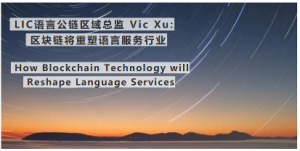By Vic Xu | 许子爵 ; Translated by Trevor Cook • Source: Yifeng 2019 Fall Issue

(编者按:区块链是当前一大热点话题,编者尤其想要特别提及的是Trevor Cook,他自从2018年夏刊就担任《译风》的编辑。Trevor是一名ATA认证的中进英译员,多年来他为全球客户提供翻译和其他语言及文化服务。目前,Trevor考入法学院继续深造。我们在此特别感谢他多年来对美国译协中文分会的贡献和付出。我们也祝愿他在法学院如鱼得水,再展宏图。)
Public interest in the blockchain technology underlying cryptocurrency has been growing since Bitcoin’s emergence in 2009.
2009年,比特币诞生,随着人们对比特币的关注度不断提高,作为比特币底层技术的区块链走入人们的视野。
Although the idea of a “blockchain” may seem a profound mystery to many, at its root, the technology is a decentralized form of data storage, a simple structure of “blocks” connected by a “chain.” Each block stores its own piece of information, and these blocks join together to form the blockchain. If the data in any particular block is to be modified, then the information in all the blocks must be modified at the same time. The practical effect of the technical difficulty of such simultaneous modification is that a blockchain is tamper-proof. Similarly, when the information within a certain block is to be modified, all the other blocks in the chain must acknowledge the modification, an important feature known as the consensus scheme.
对于很多人来说,区块链神秘且深奥。但归根到底,区块链是一种去中心化(decentralized)的数据存储方式。简单来说,区块链=区块+链。每一个区块都包含个体存储的信息,无数个区块连在一起,就形成了一条链,这就是区块链。如果要修改某一个区块上的信息,则必须同时修改区块链上所有区块的信息,这在技术上是很难实现的,因此它是不可篡改的(Tamper-proof)。同样,如果要修改某一个区块上的信息,则必须让链上所有的区块都认可这种修改,这就是共识机制(consensus scheme)。
Consider a simple example of how this might work in practice. When two people are married, they must present themselves at a government office and receive a marriage certificate before they become husband and wife and the relationship is formally acknowledged. In this common model of marriage administration, the government office is a centralized intermediary. If the government office did not exist, then the couple would have to inform every person in the world of their marriage before it could be universally known and acknowledged. Such decentralized notification, of course, would be impossible. Blockchain technology can overcome barriers to decentralized recognition. The couple would only need to write their marriage into a block, and then, as soon as that block was formed and recognized, all the other blocks on the chain would be notified, and everyone on the blockchain would verify and recognize the new marriage. This whole process would be completed instantaneously, and if everyone in the world were on this blockchain, then everyone in the world would become aware of the couple’s marriage, and the existence of the original government office would no longer be necessary—decentralization of marriage administration would be achieved.
举个例子,如果两个人结婚,他们必须到政府机构进行登记,领取结婚证,这才意味着这两个人正式成为夫妻,这种关系才能被承认。在这种模式下,政府机构就是一个中心化的媒介。如果没有政府机构的存在,那么他们必须把结婚这件事告诉这个世界上的每一个人,婚姻关系才能被知道和承认,这显然是不可能做到的。但是区块链技术能解决这一难题。他们只需要把结婚这件事写进一个区块,一旦区块形成并且被确认,那么其他的区块都会被通知,这样区块链上所有的人都知道了他们结婚的事实并予以核实承认,而这一切,都将在短时间内被完成。如果全世界的人都在这条区块链上,等于全世界的人都知道了他们结婚,政府机构也就没有存在的必要了,这就是去中心化。
Blockchain technology development has occurred in three major phases. Blockchain 1.0 was the development and application of Bitcoin, when the public first discovered the technology behind Bitcoin thanks to its special decentralized nature.
事实上,区块链走过了3个发展阶段。区块链1.0是比特币的发明和应用。也正是由于比特币去中心化的特点,人们发现了比特币背后的区块链技术。
Blockchain 2.0 arrived with the development of smart contracts, such as those enabled by the Ethereum platform. A smart contract can automatically initiate a transaction as soon as the conditions of performance previously agreed to by parties to the transaction are satisfied, without the need for involvement of a third party.
区块链2.0是以以太坊(Ethereum)为代表的智能合约。当交易的行为满足交易双方事先设定的条件时,交易即可被启动,不需要第三方的参与,这就是智合约。
Blockchain 3.0 refers to the broad adoption of blockchain technology throughout various industries and is expected to explode in popularity in the next five years. The decentralized nature of the blockchain will surely disrupt the language services industry that is currently so reliant on centralized intermediaries. The potential for blockchain technology to transform industries are broadly acknowledged and anticipated. How will this transformation affect the language services industry? Each of blockchain technology’s unique characteristics, as described below, can be applied to specifically benefit the language services industry in a different way. If an organization can master the use of blockchain technology, it will be able to smash through many of the barriers that have historically constrained the language services industry.
区块链3.0是区块链技术在不同行业的广泛应用在未来的5年内,不同行业的区块链应用将迎来爆发式的增长,区块链的去中心化将为高度依赖中间媒介的语言服务行业带来颠覆性的改变。总而言之,区块链将对全球各行业带来巨大变革,这是已经得到广泛认同的历史趋势。区块链对语言服务行业会带来什么影响?我们可以发现,区块链的每个特性,都可在语言服务行业得以恰到好处的应用。企业如果能运用好区块链这一技术,将全面破解千百年来一直困挠语言服务行业的难题。
A tamper-proof, permanent record. In today’s translation industry, the kind of work a translator receives is driven by translation companies’ experience with the translator. This situation arises because translators are reliant on translation companies, and if a translation company thinks a certain translator provides a high level of product, then that translator can obtain well-compensated translation work. However, this model makes it difficult for the translator to receive business from clients outside of those translation companies, simply because those outside of this loop lack the means to learn of the translator. Thus, high-quality translators are sometimes limited to only poorly-compensated work, which is terribly unfair to the translator. If a translator’s personal file could be impartially and objectively stored on a tamper-proof blockchain, then such transparent and reliable information about the translator would enable more language services customers to find translators who meet their needs, thereby expanding the channels through which translators obtain translation work.
区块链的永久记录(Permanent record)和不可篡改(Tamper-proof)。在目前的翻译行业中,译员能接到什么样的工作取决于翻译公司对这名译员的认可程度。这是因为译员对翻译公司的依赖程度高,翻译公司觉得某个译员的水平高,这个译员就能够得到高回报的翻译工作。因此,译员很难接到翻译公司以外的订单,最根本的原因是外界缺乏对该译员的了解,使得有时高水平的译员只能无奈做低报酬的工作,对于译员来说极不公平。如果译员的个人档案能够被公正客观的记录在区块链上,由于区块链的不可篡改性,译员的信息将更加透明可靠,这将有利于更多的语言服务需求方找到符合条件的译员,拓宽译员获取翻译工作的渠道。
Traceability. A corpus or glossary is a precious resource of both translators and translation companies, particularly companies that employ artificial intelligence (AI) and translation engines that are readily optimized by corpus training. However, these precious resources go “dormant” immediately after they are delivered: translators and translation companies will not willingly share corpuses because such sharing cannot benefit them. If the ownership rights to a corpus could be secured and the leakage of valuable corpus data prevented, then corpus owners could obtain royalties every time a translation technology company used their corpuses. This would encourage more corpus owners to affirm the right of corpus ownership, and, as the general availability of corpuses increased, the translation engines of translation technology companies could be optimized, thereby promoting the growth of the language services industry as a whole.
区块链的可追溯性。对于译员和翻译公司而言,语料(corpus)是一笔珍贵的资源,尤其对于AI(人工智能)和翻译引擎技术公司而言,这将极大的优化他们的翻译引擎。但这笔珍贵的资源在交付后即进入沉睡状态。译员和翻译公司不会主动将语料进行分享,因为这并不能使他们得益。如果能在不泄漏语料信息的情况下对语料的所有权进行确认,一旦语料被翻译技术公司匹配并使用,语料所有者每次均可获得对应的奖励。一方面,这将鼓励更多的语料所有者对语料所有权进行确认,另一方面,随着语料规模的增多,翻译技术公司的翻译引擎将得到极大的优化,从而促进整个语言服务行业的发展。
Point-to-point transactions and smart contracts. Within the highly centralized translation industry, translators must rely on a structure of intermediaries that greatly reduces their own income potential. Blockchain technology can decrease their reliance on this system of intermediaries. Qualified translators could use the blockchain’s capacity for point-to-point transactions and smart contracts to automatically match with appropriate language services customers and obtain business from outside of their network of intermediary companies and personal networks.
区块链的点对点交易和智能合约。翻译行业是中心化程度极高的行业,译员高度依赖中介机构,使得自身的收益大大缩水。通过引入区块链点对点交易以及智能合约,符合条件的译员可被自动匹配到相应的语言服务需求方,译员可获得来自合作中介公司和个人圈子以外的商业订单,降低对中介机构的依赖。
The token incentive structure. Within the highly diffuse language services industry, translators, end customers, translation engine companies, and technology companies are all independent entities. Since the “tokens” produced by a blockchain have inherent utility, can be exchanged for payment, and have the potential to grow in value, they can be used as an incentive by organizations within the blockchain ecosystem. Parties within the language services ecosystem could exchange tokens for desired resources or services. Token value would increase as the ecosystem expands, and token holders could choose to exchange them for legal currency through a cryptocurrency exchange or continue to hold them as an investment.
区块链的通证(token)激励机制。在语言服务行业中,译员、客户、翻译引擎公司,技术公司等主体相互独立,高度分散。区块链的通证既具有使用及支付的功能,也具有升值的潜力,因此被区块链企业用于生态的激励。在语言服务行业的生态系统中,各方使用通证换取相应的资源或服务。随着生态系统规模的扩大,通证的价值会不断升高,通证的持有者可选择在数字货币交易所(cryptocurrency exchange)将通证卖出换取法定货币,或继续持有通证作为投资。
The blockchain’s consensus mechanism. Language is difficult to quantify in the translation industry; only individual translation companies can recognize a translator’s ability and integrity, and there is no centralized standard for evaluation. The decentralized consensus mechanism of the blockchain could enable translators to be evaluated by client companies and other translators in their network, increasing the transparency and objective assessment of individual translators’ skills and increasing the reliability of their personal records.
区块链的共识机制。在翻译行业中,语言是难以被量化的,译员的能力和诚信水平只能由翻译公司来认可,缺乏统一的评判标准。区块链去中心化的共识机制,使得译员能被合作过的公司以及圈子内的其他译员所评价,译员的能力水平和诚信水平将更加透明和客观,使得译员的个人档案更加真实可靠。
If the birth of the Internet initiated a third Industrial Revolution, then the arrival of blockchain technology marks the start of a fourth Industrial Revolution. This technology will fundamentally reshape the language services industry by maximizing the value of individual participants and allowing resources to be shared within the industry to the greatest extent possible. I believe that in the future, more blockchain technology organizations will emerge and bring further change and growth to the language services industry.
如果说互联网的诞生是第三次工业革命,那么区块链的诞生将会是第四次工业革命。区块链技术将从根本上重塑语言服务行业,让个体的价值得到最大的发挥,让资源最大程度的在行业内得以共享。相信未来会涌现出更多运用区块链技术的企业,为语言服务行业带来更多变化和发展。
 Vic Xu(许子爵)在LIC Chain(www.licchain.io)担任区域主任,他毕业于新加坡国立大学(National University of Singapore)法律系并取得硕士学位。毕业后,Vic进入一家新加坡上市金融集团并在两年的时间内成为公司首席法务顾问(Chief legal counsel),带领法律团队完成公司多起海外收购兼并,提供法律合规(Legal compliance)方面的建议。文章截稿后,Vic已转往传神(LIC的母公司)服务(www.transn.com)。
Vic Xu(许子爵)在LIC Chain(www.licchain.io)担任区域主任,他毕业于新加坡国立大学(National University of Singapore)法律系并取得硕士学位。毕业后,Vic进入一家新加坡上市金融集团并在两年的时间内成为公司首席法务顾问(Chief legal counsel),带领法律团队完成公司多起海外收购兼并,提供法律合规(Legal compliance)方面的建议。文章截稿后,Vic已转往传神(LIC的母公司)服务(www.transn.com)。
Translator Trevor Cook is a professional Chinese-to-English translator and current editor of Yifeng and hopes to see more Chinese-language content submitted. If you would like to submit an article in Chinese or demonstrate your translation skill in the publicly available Yifeng (in either direction of Chinese < > English), please contact him at trevor@cookintercultural.com.
Leave a Reply